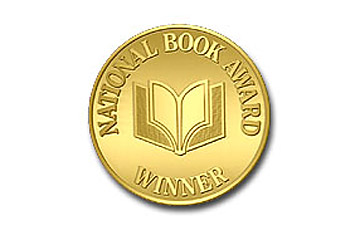
These days, it seems, a book's not a book if it ain't got a seal on it. There's the Booker Prize, the Nobel Prize, Oprah's Book Club, and, on Nov. 19, the 58th annual National Book Awards (NBA) ceremony — in which the National Book Foundation will present four $10,000 prizes to an author in each category: fiction, nonfiction, poetry and young people's literature. Judges — who are writers nominated by past NBA winners, finalists and judges and then selected by the foundation's board — hold deliberations independently of board and staff members. Winners are only announced that night, giving the awards ceremony a bit of the old Oscars surprise.
The first awards ceremony took place at the Waldorf Astoria in New York City on March 16, 1950, co-sponsored by three other literary organizations in a coup of writers awarding other writers. Nelson Algren won in the fiction category for his tragic American hero story, The Man with the Golden Arm, William Carlos Williams in the poetry category for his work Paterson: Book III and Selected Poems, and Dr. Ralph Rusk in the nonfiction category for The Life of Ralph Waldo Emerson. The New York Times noted the following day that "of the principal prize winners only one, Mr. Algren, had been on the best-seller lists" and all three "shared the common lot of being in part hard to read." Other renowned (if narratively challenging) recipients over the years include Joan Didion, William Faulkner, Saul Bellow and Susan Sontag.
The goal of the awards ever since has remained essentially the same, and in 1989 became the principle behind its corresponding organization, the National Book Foundation: to bring unheralded literature to national recognition, and to promote literacy in underserved communities throughout the United States. The award's impact, however, seems to be felt most within the publishing world itself. Foundation board members, in fact, come largely from prominent publishing companies including Penguin, Perseus Books, W.W. Norton & Co. and Simon and Schuster, with a few members drawn from related fields.
Last year's fiction winner, Denis Johnson's 624-page Tree of Smoke (Farrar, Straus & Giroux), for example, was a critical darling and Pulitzer finalist, that, like those first NBA winners, failed to top bestseller lists. And in 2001, Jonathan Franzen, winner of the fiction award for his 500-page work The Corrections, bristled at being chosen for Oprah's Book Club a month prior, inciting calls of elitism from other writers. But the foundation has recognized some household names in its past: Oprah Winfrey herself received a Medal for Distinguished Contribution to American Letters in 1999, as did horror master Stephen King in 2003.
Publishers, not surprisingly, laud the award as prestigious and important because of the attention it brings, although some critics argue that larger publishers have an advantage because of their proximity to the National Book Foundation (headquartered, like nearly every publisher mentioned here, in New York City) and their financial ability to pay the contest's entry fees. In addition to the fee, publishers must agree to contribute $1,000 to a promotion campaign if the book becomes a finalist, purchase medallions to affix to finalist and winning books, and get authors to agree to participate in the foundation's website-related publicity.
The National Book Awards don't have as large an impact on book sales as the Pulitzer Prize or Oprah's seal of approval, but the honor remains highly sought after nonetheless. This year's finalists include Drew Gilpin Faust's This Republic of Suffering: Death and the American Civil War, Peter Matthiessen's controversial Shadow Country, which came under fire for being a re-written compilation of three novels that he wrote in the 90s and Patricia Smith's collection of poems Blood Dazzler, which describe New Orleans before, during and after Hurricane Katrina. With 1,258 books submitted from more than 200 publishers (nonfiction leading the submission pack with 540 entries), the allure of the golden seal doesn't seem to be tarnishing anytime soon.
